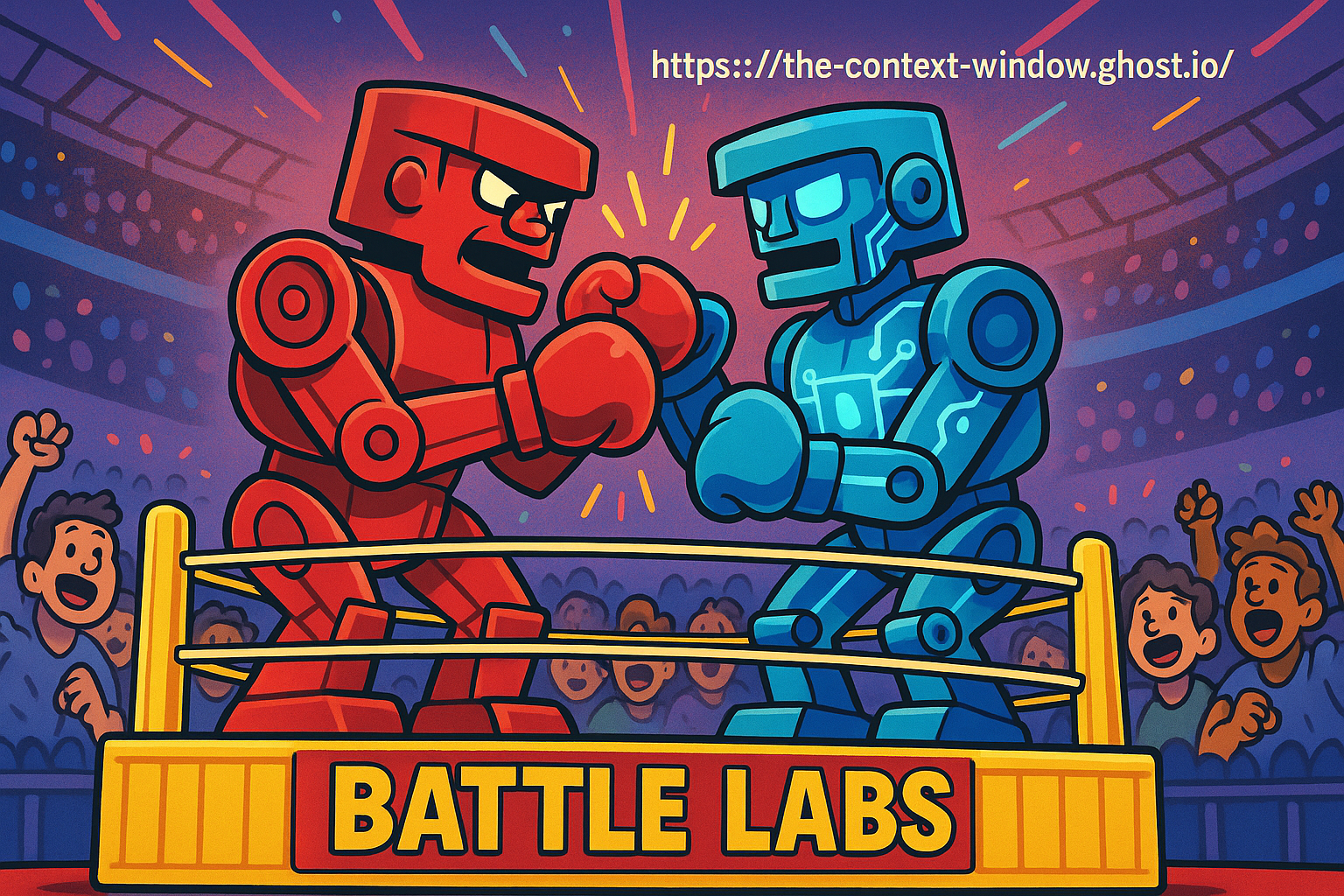This Week In GenAI: Battle Labs

This Week in GenAI: Battle Labs & Anthropic Gives Claude a No-Code Upgrade
The GenAI landscape is continuing to rapidly consolidate around features, with so much feature parody it's a term call Battle Labs. This week provided fresh clarity on how pricing, talent, developer tools, and legal rulings are shaping the future for AI builders, entrepreneurs, and SMBs. Here’s a roundup of the moves you need to track closely:
Battle Labs
Pricing Levels Start to Converge
We’re quickly reaching the era of clear pricing tiers. Frontier AI labs and platforms have coalesced around a standardized pricing structure: entry-level (free), prosumer ($20), and high-volume ($200+). Cursor introduced its $200/month Ultra plan, offering power users 20x the Pro plan’s model access and early features across OpenAI, Anthropic, Gemini, and xAI. Google responded with its Gemini AI Ultra at $249.99/month, packing Gemini 2.5 Pro, multimodal generation (Veo 3), and massive cloud storage (30TB). Anthropic was one of the first to introduce premium tiers with Claude Max, offering two tiers—$100 for 5x usage and $200 for 20x usage—with access to Claude Sonnet and Opus.
These clear tiers simplify budgeting and scaling for everyone. Builders get predictable costs, entrepreneurs can strategically plan rollout budgets, and SMBs now clearly understand when to upgrade their subscription tiers.
Talent Wars Heat Up: Meta Raids OpenAI Zurich
Meta’s aggressive hiring continues, recently nabbing three researchers from OpenAI Zurich—Lucas Beyer, Alexander Kolesnikov, and Xiaohua Zhai. While nine-figure signing bonuses have been rumored, Meta CTO Andrew Bosworth insists those numbers are exaggerated. Regardless of the specifics, this move highlights that AI’s critical bottleneck is research talent.
This intensified competition will inevitably drive up compensation and lengthen hiring timelines. As a result, startups should brace for quicker diffusion of proprietary knowledge, and SMBs might find a silver lining—this talent shakeup could spark new tool-focused startups catering specifically to smaller or niche markets. The pursuit of AGI/SGI has focused the hiring lens on the top few hundred AI researchers in the world, but at some point, the focus will shift to top Go-To-Market Strategists as the builder community continues to mature rapidly.
Productivity Suites Begin To Come Into Focus: OpenAI and xAI Enter the Fray
The battle for office productivity now includes AI-first tools. OpenAI is quietly integrating real-time collaborative document editing directly into ChatGPT—imagine co-authoring documents, managing comments, and receiving real-time AI assistance without ever leaving the ChatGPT interface. Meanwhile, Elon Musk’s xAI is rumored to be embedding spreadsheet editing capabilities directly within Grok, aiming at the "everything app" vision.
Builders should anticipate rapid opportunities to integrate or extend these new workflows to meet niche industry needs. Entrepreneurs face a pivotal UX decision: do users prefer a unified AI workspace or multiple specialized tools? SMBs might soon bypass legacy productivity tools entirely, opting instead for these new, cost-effective, AI-powered suites. Google has a leg up in this space, providing everything from infrastructure and productivity apps to frontier models. Notably, AWS remains conspicuously absent, struggling to capitalize on its cloud leadership and fumbling the rollout of its internal IDE.
The Command-Line Battlefront: Gemini, OpenAI, Anthropic Compete for Terminal Space
Google has entered the terminal battlefield with Gemini CLI, an open-source AI agent powered by Gemini 2.5 Pro (and Flash when you hit preset limits). Released on June 25, Gemini CLI offers cross-platform, natural-language support for tasks like coding, debugging, content creation, and multimedia generation with Imagen and Veo. It joins OpenAI’s privacy-first Codex CLI and Anthropic’s context-rich Claude Code, creating a robust lineup of AI-driven developer tools.
Google leveraged its scale by offering Gemini CLI an unmatched free tier of up to 1,000 daily requests or 60 requests per minute, inviting community-driven enhancements and signaling fierce competition ahead. The terminal is quickly becoming the epicenter of AI-enhanced developer productivity.
Watch: There's an ongoing battle between AI-powered IDEs and agent-driven CLI tools released by more than just the frontier labs.
Product Releases
OpenAI’s Platform Evolution
OpenAI continues its transformation from a pure research lab into a robust enterprise platform as it begins to directly compete with its largest early investor, Microsoft. The new "OpenAI for Government" offering provides ChatGPT Enterprise within FedRAMP-compliant Azure environments, secured by a major $200 million Department of Defense pilot. Additionally, its Deep Research functionality—previously limited to Pro users—is now broadly accessible, and API webhook integration unlocks event-driven workflows, significantly expanding enterprise use cases.
Anthropic’s Artifacts: Becoming a No-Code Powerhouse
Anthropic’s Claude has dramatically upgraded its Artifacts feature, transitioning it into a no-code app builder. Users describe the apps they need—such as interactive quizzes, data analyzers, teaching tools, and even games—and Claude instantly creates shareable mini-apps.
Artifacts offload builders' API costs to end-users, removing distribution barriers for early builders, empowering hobbyists, entrepreneurs, and SMBs to rapidly prototype and deploy AI-driven apps. As vibrant as Vibe Coding has been recently, expect no-code/low-code tools and social platform aspects to continue growing rapidly.
Infrastructure & Model Availability: Diversifying Compute
OpenAI’s adoption of Google’s Tensor Processing Units (TPUs) marks a strategic pivot towards diversified compute infrastructure. Driven by GPU cost and availability constraints, this move offers substantial efficiency gains and price advantages. OpenAI’s parallel effort—designing its own ASIC chips and expanding cloud partnerships—underscores a broader industry shift towards heterogeneous hardware ecosystems, essential for resilience and sustainable growth in GenAI. This move also hints at potential availability expansion via Google Cloud services.
Legal Clarity: AI Training Wins Narrow Fair-Use Rulings
Two major legal decisions this month provided cautious optimism for generative AI. Anthropic won a critical ruling affirming transformative fair use for lawfully acquired, digitized books used in model training, though the court also noted that acquisition and retention of pirated copies was not fair use. Meta successfully defended itself against similar claims, with the court emphasizing that clear market harm evidence is essential, even acknowledging fair use for works obtained from piracy websites while introducing a new theory of "market dilution." These rulings offer important guardrails for builders but underscore ongoing compliance and data-rights management needs.
As we close out this week's analysis of the GenAI landscape, it's clear that the forces of pricing, talent, tooling, and legal clarity are not just shaping the present, but actively defining the future. These 'battles' and consolidations point to a more mature, yet still highly dynamic, AI ecosystem. For AI builders, entrepreneurs, and SMBs, the ability to adapt, innovate, and make informed decisions will be paramount. Prepare for continued shifts and new opportunities by staying ahead of the curve. If you're looking for guidance to build resilience and strategically scale your AI solutions amidst these changes, I'm here to partner with you. Let's work together to future-proof your approach to GenAI.
Written by JD Fetterly - Data Governance PM @ Apple, Founder at ChatBotLabs.io, and Generative AI enthusiast.
